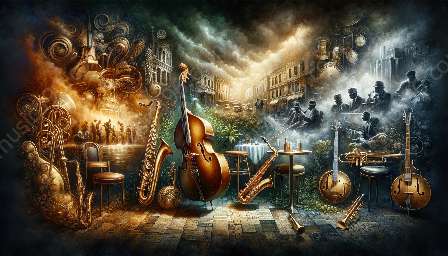Indian classical music has a rich history and a unique set of performance etiquette that has been honed over centuries. This article explores the key elements of performance etiquette in Indian classical music and its influence on the history of music.
History of Indian Classical Music
Indian classical music has evolved over thousands of years, with roots dating back to ancient Vedic texts and scriptures. It has a strong tradition of oral transmission, and its history is linked to the socio-cultural and spiritual aspects of Indian society. There are two main schools of Indian classical music: Hindustani and Carnatic. The history of Indian classical music is deeply intertwined with the philosophy, aesthetics, and cultural traditions of India, making it a unique and integral part of the country's heritage.
Performance Etiquette in Indian Classical Music
Indian classical music has a specific set of performance etiquette that governs the way musicians present themselves and interact with their audience. These key elements of performance etiquette are essential for maintaining the integrity and sanctity of the musical tradition. Some of the most important elements of performance etiquette in Indian classical music include:
- Raga and Tala: Raga, the melodic framework, and Tala, the rhythmic cycle, form the foundation of Indian classical music. Musicians must respect the unique characteristics of each Raga and Tala, adhering to their rules and intricacies during performances.
- Guru-Shishya Parampara: The tradition of Guru-Shishya Parampara, where knowledge is passed down from master to disciple, plays a pivotal role in Indian classical music. Musicians are expected to show reverence and gratitude to their Gurus and maintain a respectful student-teacher relationship.
- Amalgamation of Emotion and Technique: Indian classical music emphasizes the fusion of emotion and technique. Musicians are expected to convey intricate emotions through their music while demonstrating exceptional technical skill, creating a captivating and deeply moving performance.
- Concert Environment: Musicians are expected to maintain a serene and respectful environment during concerts. The audience is encouraged to embrace the meditative aspect of the performance, and disruptions or distractions are frowned upon.
- Interaction with the Audience: Interacting with the audience in a humble and dignified manner is an important aspect of performance etiquette in Indian classical music. Musicians convey their appreciation for the audience's presence and response without compromising the sanctity of the performance.
- Improvisation and Swara Prastara: Improvisation is a hallmark of Indian classical music, allowing musicians to express their creative prowess. Swara Prastara, the intricate embellishment of musical notes, requires careful attention and mastery, showcasing the musician's skill and artistry.
- Adherence to Tradition: While innovation is valued, musicians are expected to uphold the traditional elements of Indian classical music. This includes respecting ancient compositions, preserving the essence of the musical form, and adhering to the rules and structures that define the tradition.
Influence on the History of Music
The performance etiquette in Indian classical music has significantly influenced the broader history of music. Through its emphasis on disciplined practice, spiritual connectedness, and emotional resonance, Indian classical music has inspired and contributed to the evolution of various forms of music worldwide. Its impact can be seen in the incorporation of improvisation, rhythm, and melodic intricacies in diverse musical genres, from jazz to world music.
Moreover, the principles of respect, humility, and dedication inherent in the performance etiquette of Indian classical music have transcended cultural boundaries, serving as a timeless model for musicians across different traditions. The profound impact of Indian classical music on the history of music underscores the enduring relevance and significance of its performance etiquette.




































